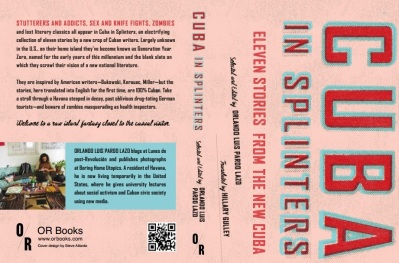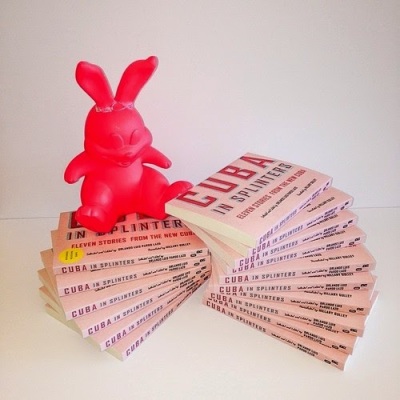Imagine a country sequestered by a national narrative that leaves no space for dissent or even for disappointment.
Imagine the consequences for imagination in such a closed environment, aggravated by a mass media monopoly that occupies every channel of information, opinion, criticism and legitimation.
Imagine language itself as a prison, with grammar reduced to inertia, with syntax subjected to socialization and desire doomed to discipline, where beauty is suspected of being subversive, the whole vocabulary becoming a kind of vocubalary that makes superfluous any censorship because self-control is now constitutional.
Is fiction feasible under such pressure, between the Revolution and the deep red sea? But, isn’t fiction fostered best under the most despotic rhetoric? Creativity as resistance. Danger as the measure of all things. Literature understood as limiterature.
In the early 90’s, Fidel Castro and his Special Period in Peacetime threatened the Island with the so-called Option Zero: namely, concentration camps to survive local famine as the European Iron Curtain fell and Cuba found itself naked in a post-Cold War Era.
Paradoxically, this meant tons of fresh air for Cuban writing. Please, don’t laugh if you think it’s ridiculous but alas, yes, for the first time since 1959, our authors could publish their books abroad, skipping the need for official permission. Besides, the government’s Non-Governmental Organizations allowed writers to collect honorariums and copyright fees in hard currency, while prodigious privileges were being distributed according to the cultural politics of the “rule of loyalty”: to rent a house, to have access to the internet, to import a car, to own a passport with an exit permit.
Yet, despite the more ample margins for tolerance in terms of content, confrontational voices were still coerced, blackmailed, fired from their jobs, marginalized, stigmatized, beaten, jailed and forced to choose between silence or exile.
In fact, at the beginning of the 2000’s or Years Zero, maybe as guarantee of the original Option Zero, our literary field attained both tokens of totalitarianism: silence and exile. Thus, it was about time for a generation to start from zero.
Generations, of course, do not exist at all. In the case of Generation Year Zero, the 11 outlaws included in CUBA IN SPLINTERS (an anthology of new Cuban narrative translated by Hillary Gulley for O/R Books in New York 2014), behave like okupas or squatters or rather like textrrorists. Provocation as the distinctive trademark of a dysfunctional generation that, out of apathy and almost aphasia, are focusing their fiction on the black holes of memory and tradition, digging into the uncomfortable and the unpleasant, cannibalizing our cannon, escaping from correctness, reappropriating political scenarios to disrupt their logic, a bet on horror instead of heroes,épater le proletaire, vengeance as a fine art, yet from bad painting to worse writing, insisting on a scatological esthetics far from all Cuban stereotypes expected both by conventional readers and foreign editors.
The fragmentary as a splintered strategy to express the inexpressible, fractals versus fossils. A diary of dystopia as the cynical symptom to dynamize and dynamite our State establishment, dealing with a decubanized Cubanness not as scandalous as scoundrelous. I’m afraid that in this bible of the barbaric, quod scripsi, is crisis.
And the 11 trouble-makers of CUBA IN SPLINTERS by O/R Books have plenty of experience in this, since during the last decade they were the editors of the Cuban clandestine boom of independent digital magazines, like Cacharros(s), 33 y un Tercio, DesLiz, La Caja de la China, The Revolution Post, Voces, among other conflictive documents.
Let’s recognize that almost another dozen of writers could have been included in this literary warfront of new narrative: Lizabel Mónica, Osdany Morales, Jamila Medina, Ainsley Negrín, Abel Fernández-Larrea, Arnaldo Muñoz Viquillón, Legna Rodríguez, and Evelyn Pérez, for example. It is very likely that this anthology of newrrative is the portrait of a family that never was.
The communicating vessels between these short-stories are not bridges, but short-circuits: the tension among each fiction hopefully will produce a fertile friction that will render fractions of sense and nonsense, a bit of idiocy after so much ideology, from the Berlin Wall to the wall of the Florida Strait, from Fidel’s bodyguards to sex for sale at a regional train station; snob Buddhism and socialist zombies; cannabis cubensis so the mind can emigrate before our body crosses the claustrophobic line of the horizon; Habaniroshima, mon amour, the cenotaph city like tears in the ruins of a rheumatic Revolution; remake and collage, plagiarism taken to the paroxysm; who knows if poetry for the pariahs of the Cuban holocastro. It is also very likely that this anthology of newrrative is the portrait of a family meant never to be.
Del clarín, escuchad el silencio, as these 11 anti-national hymns turn out to be hyper-nationalistic histories, as no Cuban can truly escape from Cuba. Fidelity has given way to fatality. So, let it read. Or at least, let it rip these many Cubas in splinters. Unrest in peace.
Original in English
23 November 2014


